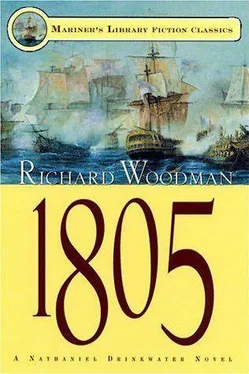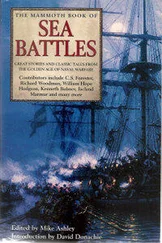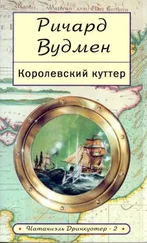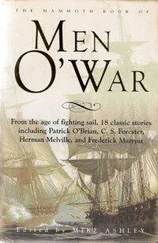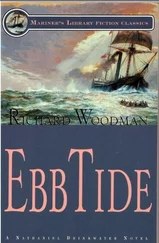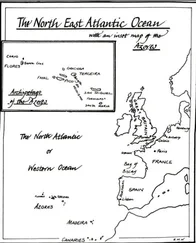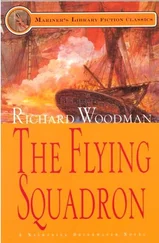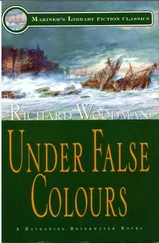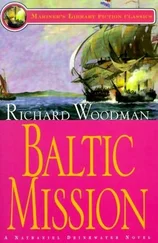'And gave it to me for personal delivery to the Admiralty in the event of anything untoward occurring to him. He seemed intent on making his way south to his estate and joining his wife. I cannot believe he took his own life.'
Dungarth shook his head and picked up another paper from his desk. It seemed to be in cipher and beneath the queer letters someone had written a decoding. 'I have received various reports, mainly public announcements after the post-mortem which, I might add, was held with indecent haste. Also some gossip from the usual waterfront sources. He wrote to the Minister of Marine, Decrès, from Morlaix, also to some captains he proposed calling as witnesses at the enquiry he knew would judge his conduct. They were Infernet and Lucas, who had both been lionised by the Emperor at St Cloud. He received no reply, travelled to Rennes and arrived on the seventeenth. Witnesses at the post-mortem conveniently said he was depressed. Hardly remarkable, one would have thought. Then, on the morning of the twenty-second of April his body was found with six knife wounds in the heart. The body was undressed, face upwards. One witness said face down, but this conflicting evidence seems to have been ignored. Evidence of suicide was supported by the discovery of a letter to his wife and his telescope and speaking trumpet labelled to Infernet and Lucas. Ah, and the door was locked on the inside… that is no very great achievement for a man of Santhonax's abilities…'
'Santhonax?'
Dungarth nodded. 'He arrived in town the previous evening, Nathaniel. In view of the fact that he was at the post-mortem, I regard that as a most remarkable coincidence, don't you? And consider: Villeneuve is alleged to have stabbed himself six times in the heart. Six , Nathaniel, six! Is that consistent with the man you knew, or indeed for any man committing suicide?'
Drinkwater shook his head. 'I think not.'
'No, nor I,' said Dungarth vehemently. 'I wish to God we could pay Santhonax in like coin, by God I do.'
The eyes of both men met. Drinkwater recalled Dungarth passing up an opportunity to shoot both Santhonax and his wife Hortense as Camelford had advised. Perhaps if Camelford had succeeded in his mission neither he, nor Villeneuve, nor little Gillespy would be dead. 'I think Villeneuve anticipated some such end, my Lord,' Drinkwater said solemnly. 'I think he felt it his destiny.'
'Poor devil,' said Dungarth, his hazel eyes glittering intensely. 'Trafalgar notwithstanding, Nathaniel, this damnable war is not yet over.'
'No, not yet.'
'And that bastard Santhonax has yet to get his just deserts…'
In using the Trafalgar campaign as a basis for a novel I have not consciously meddled with history. All the major events actually took place and many of the characters existed. I have used a novelist's freedom in interpreting the actions of some of these, such as Camelford, who remains an enigma to this day. As for the others, I have used their written or recorded words or opinions to preserve historical accuracy.
There is no doubt that Napoleon's intention to invade Great Britain some time between 1803 and 1805 was very real indeed. That he swung his army away from the Channel to defeat Austria and Russia does not diminish that intent; it merely illustrates his disillusion with his admirals, an understandable desire to secure his rear after the formation of the Third Coalition, and the strategic adaptability of his genius.
A great deal has been written about Trafalgar and its consequences. Perhaps the most lamentable of these is an improper appreciation of our opponents. It was this reflection that attracted me to the character of Pierre de Villeneuve, the noble turned republican, whose abilities have been entirely eclipsed by the apotheosis of Nelson. It was Villeneuve's prescience that made him the 'coward' his contemporaries took him for. Ten months before the battle, Villeneuve outlined the precise method by which Nelson would attack. Realising this and the comparative qualities of the two fleets, Villeneuve was astute enough to foresee the likely outcome of action, notwithstanding his plan for a counter-attack. Of his personal courage or that of his fleet, there is no doubt. I hope I have done justice to their shades.
None of these assertions detract from the British achievement; quite the contrary. The Battle of Trafalgar remains the completest example of annihilation of a battlefleet until the Japanese attack on Pearl Harbor. Nevertheless there were grave misgivings about Nelson's ideas of how a blockade ought to be conducted, and these were freely expressed at the time. History vindicated Nelson, but contemporary opinion was not always so kind, and French officers like Santhonax wanted to exploit what was held to be a weakness. Napoleon always disclaimed any part in the death of John Wesley Wright and profoundly regretted that of D'Enghien. Between denial and admission lie a number of other mysterious deaths, particularly that of Pierre de Villeneuve. Despite the official verdict of suicide, I find it inconceivable that Villeneuve stabbed his own heart six times and I have laid the blame elsewhere. As to Villeneuve's curious letter of denunciation, one authority states that such a document of unproven origin came to light among the papers of a British diplomat employed at the time. It seemed to me that it might have formed some part of those supplementary revelations of unrecorded history which the adventures of Nathaniel Drinkwater have exposed.
See The Corvette
